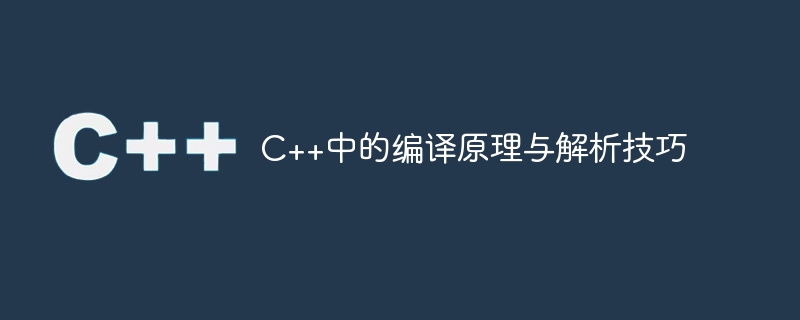Home >Backend Development >C++ >Compilation principles and parsing techniques in C++
Compilation principles and parsing techniques in C++
- WBOYWBOYWBOYWBOYWBOYWBOYWBOYWBOYWBOYWBOYWBOYWBOYWBOriginal
- 2023-08-22 13:12:161141browse

C language is a powerful programming language that is widely used in software development, game development, database management and other fields. The compilation principles and parsing techniques in C are the key to learning this language. This article will introduce the compilation principles and parsing techniques in C in detail.
1. Compilation principles of C
1.1 Preprocessor
The preprocessor in C is a program used to process preprocessing instructions. The preprocessor will Instructions starting with "#" in the code are processed. For example, the #include instruction is used to include header files into the source code, and the #define instruction is used to define macros. The processing results of the preprocessor will affect the subsequent processing of the compiler.
1.2 Compiler
After the preprocessor processes the source code, the compiler will compile the preprocessed code and generate assembly code or directly generate an executable program. The compiler is one of the most important compilation tools in C.
1.3 Linker
The linker in C is a program used to link the object files generated by the compiler into an executable program. The linker matches symbols in different object files, generates a symbol table, and converts it into an executable file.
2. Parsing skills in C
2.1 Template metaprogramming
Template metaprogramming is a C programming technique that uses types and computing capabilities in the C template system to generate code. Template metaprogramming can greatly improve the efficiency and reusability of your code.
2.2 Macros
Macros in C are a mechanism that can be used to generate code. Macros can replace code during compilation and generate specific code implementations. However, using too many macros can make the code difficult to maintain and understand, so they should be used with caution.
2.3 Smart pointer
The smart pointer in C is a pointer class that uses RAII (resource acquisition i.e. initialization) technology to automatically manage memory resources. Smart pointers can avoid memory leaks and use released memory, providing a safer and more convenient memory management method.
2.4 Exception handling
The exception handling mechanism in C allows exceptions to be thrown and caught during program running. The exception handling mechanism can ensure the stability and reliability of the program and help programmers better control the running status of the program.
2.5 RTTI
RTTI (Run-time Type Identification) is a C language feature that can obtain the actual type of an object from a pointer or reference to the object while the program is running. The RTTI mechanism can help programs implement type safety checks and dynamic type conversions.
Conclusion:
The above is a brief introduction to the compilation principles and parsing techniques in C. Proficient in these skills can help C programmers better use and develop C programs, and improve the efficiency, reliability and maintainability of the program.
The above is the detailed content of Compilation principles and parsing techniques in C++. For more information, please follow other related articles on the PHP Chinese website!

